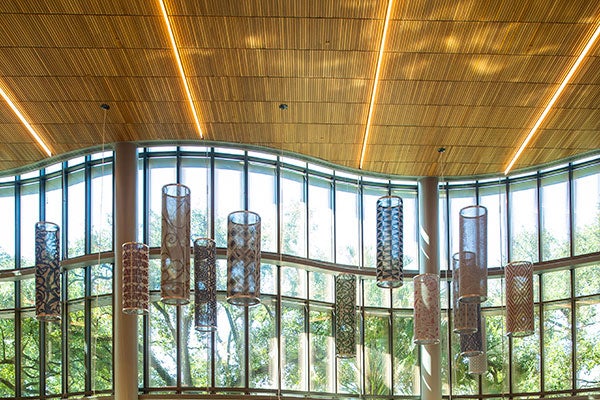
Two and a half years ago, we presented our five-year strategic plan to the Freeman community for the first time. With the theme “Business Education at the Speed of Change,” this exciting blueprint for the future — our first new strategic plan in nearly a decade — sought to map the changing landscape of business, define our competitive advantages, and align our priorities and resources to ensure that our students have the knowledge, skills and experience to face the challenges of tomorrow.
January 2025 will mark the midway point in the plan, so I wanted to share the progress we’ve made toward achieving the goals set forth.
One of the plan’s overarching strategic goals was to modernize curricula across all programs. In March 2023, we announced the launch of a new full-time MBA curriculum that prioritizes managerial data analysis, interdisciplinary experiential learning and ESG content to ensure that our graduates get the skills they need to take on the challenges of the future. We also enhanced the Master of Management in Energy (MME) program with new industry partnerships and new courses and content focusing on renewable and sustainable energy. Due in part to these enhancements, enrollment in the MME program doubled between 2023 and 2024. At the undergraduate level, we significantly enhanced the BSM curriculum by further embracing experiential learning and integrating ESG, technology and analytics content into existing courses.
Another key strategic goal was to develop new programs that respond to how today’s students want to learn. In August 2023, we launched the Online MBA, our first fully online Master of Business Administration program, which brought the academic rigor of our full-time program to a new, more convenient modality. We also sought to develop programs that align more closely with the regional economy to provide more direct paths to employment for graduates. In February 2024, we announced the establishment of the Undergraduate Certificates Program, which provides students with skills and experience in four regionally important industries: Real Estate Finance and Investment, Energy, Hospitality, and Sports Management. In August 2023, we launched a new minor in Entrepreneurial Business. Open to undergraduates from across Tulane, this program addresses the city’s need for graduates with strong entrepreneurial skills.
This fall, we officially opened the Center for Experiential Business Learning, a new center of excellence within the Freeman School that will enable us to meet our goal of dramatically expanding experiential learning opportunities and providing a technology-enhanced experiential learning space for student collaboration. Through the center and its staff, we have initiated high-value experiential learning partnerships with St. Thomas Community Health Center, the Southern Rail Commission, the Ernest N. Morial New Orleans Convention Center and many other organizations.
We also substantially enhanced the Career Management Center, including hiring additional career counselors and establishing the Industry Experts-in-Residence Program to provide students with industry-specific advising and mentoring. These efforts have yielded outstanding results, with improved placement rates for the MBA, MME and MANA programs, as well as our being added to the target schools list of employers such as McKinsey, Citi, BNP Paribas and Wells Fargo.
These items represent some of the strategic goals we have fully accomplished over the last two and a half years, but we are continuing to move forward in implementing the plan every day. Below are some of the other goals we have made substantial progress toward achieving.
We are currently developing a new BSM Industry Certificate in Artificial Intelligence in furtherance of our goal to create programs that focus on skills of the future. We are also planning to launch three new 4+1 programs to enable Tulane students to earn both a bachelor’s degree and a Freeman MFIN, MANA or MME degree in five years, resulting in significant cost savings.
We are also redesigning and integrating the curricula of all our programs directed to working professionals. To be able to provide access, flexibility and choices to a larger population of industry professionals, we are consolidating our existing programs serving working professionals — the Executive MBA, the Professional MBA and the Online MBA — in the reorganized Stewart Center as well as introducing new programs and learning modalities.
We continue to expand our faculty to meet the educational needs of our community. Over the next few years, we hope to hire new faculty in all our academic areas, including top interdisciplinary scholars in energy finance, policy and business.
Enhancing the student experience continues to be a strong focus. We recently launched Freeman Beyond, a new mobile app aimed at engaging undergraduates, and we are in the process of launching Freeman EDGE (Engage, Develop, Grow, Experience), which connects students with industry-related alumni, mentors and advisors.
Every great business school is defined by student success and industry connectivity. Those themes permeate everything we do here at the Freeman School as does a third theme: Alumni involvement. Examples of leveraging the many contributions of our alumni — such as mentoring students, providing experiential learning opportunities and advising us on cutting-edge business practices — run throughout our strategic plan. If you are interested and able to be part of this exciting and rewarding effort, please reach out to us and we will find a way for you to get involved.

